About Hakone
An easy day trip from Tokyo, Hakone (箱根), a small city in the Fuji-Hakone-Izu National Park, is known and beloved as a hot spring resort, art hub, and as one of the best places to view Mt. Fuji from.
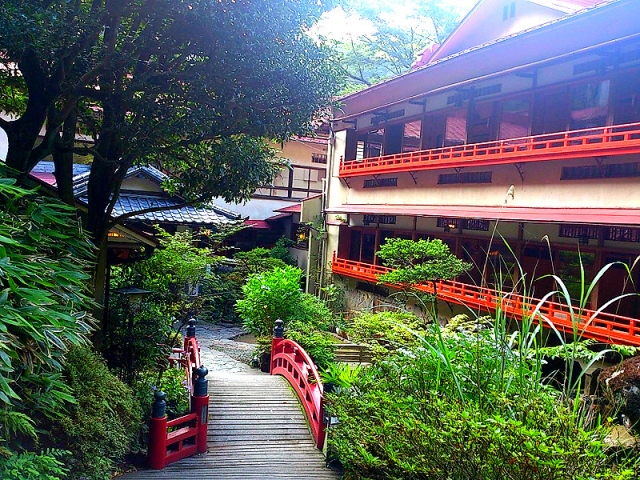
Hakone has been one of the most renowned hot spring resorts for centuries. The area boasts many onsen facilities and ryokans with many of the places being open for day-trippers. The most renowned area for hot springs is the Yumoto area, with Yumoto meaning hot spring source in Japanese.
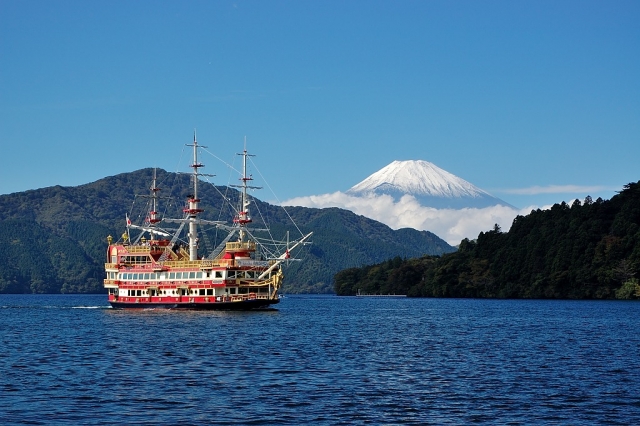
Lake Ashi, a crater lake, is the heart of Hakone’s national park. One of the main reasons to visit Lake Ashi, besides its natural beauty, is to see Mt. Fuji, Japan’s most iconic mountain. The mountain is often shrouded in clouds on days with only a slight fog, but on days of good weather you can see one of the best views of Mt. Fuji from either the shores of Ashi or on a sightseeing cruise.

In the water of Lake Ashi stands a famous red torii, entrance gate to the equally red Hakone Shrine. A staircase goes up to the shrine from the torii gate and on the other side from the village of Moto-Hakone. The shrine itself is in the midst of tall trees, and has an age-old atmosphere to it.
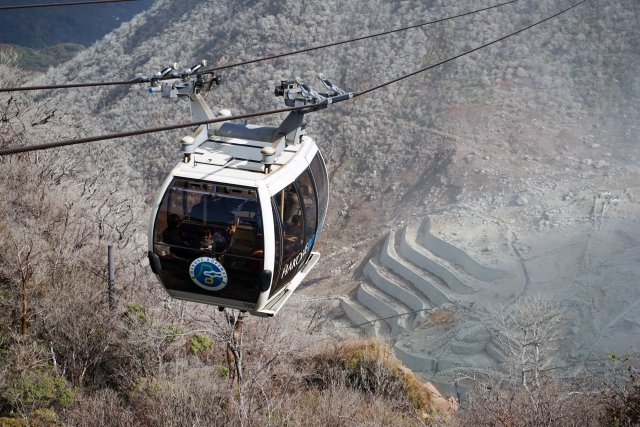
From Lake Ashi, there are two cableways running up the surrounding mountains where you’ll have a spectacular view over Mt. Fuji (if you’re lucky and the weather is good). The Hakone Ropeway runs from Sounzan Station all the way up to volcanic Owakudani (as seen in the misty photo above) and Ubako Station before stopping fully at Togendai Station, right in front of Lake Ashi.
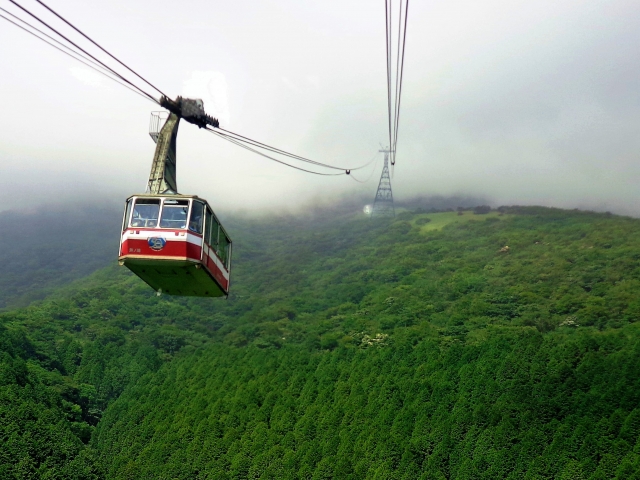
The Komagataka Ropeway has some of the best views over Mt. Fuji and Lake Ashi. The ropeway leads from Lake Ashi to the Komagatake peak of Mt. Hakone. Walk from the exit of the ropeway to the peak of the mountain and you’ll see the original Hakone Shrine called Hakone Shrine Mototsumiya. The ropeway is popular for hikers as there are several trails leading down to the shores of Ashi, Owakudani, and Sounzan Station.
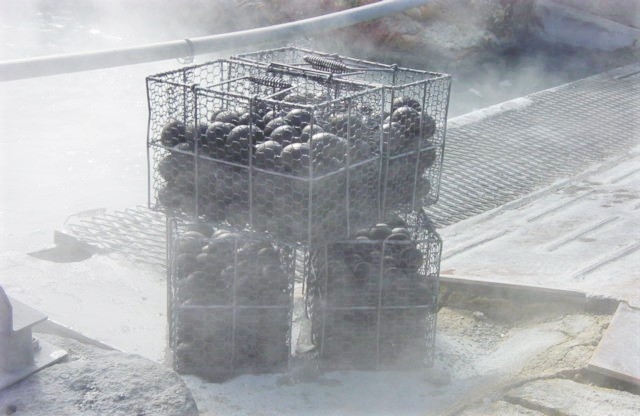
An outburst of the Mt. Hakone over 3000 years ago resulted in the making of what is now called Owakudani, a geothermal valley with a good view over Mt. Fuji on clear days. Owakuni is where you can buy the famous onsen-boiled black eggs, said to prolong your life by 7 years. Please note that hiking trails might close due to volcanic gasses.
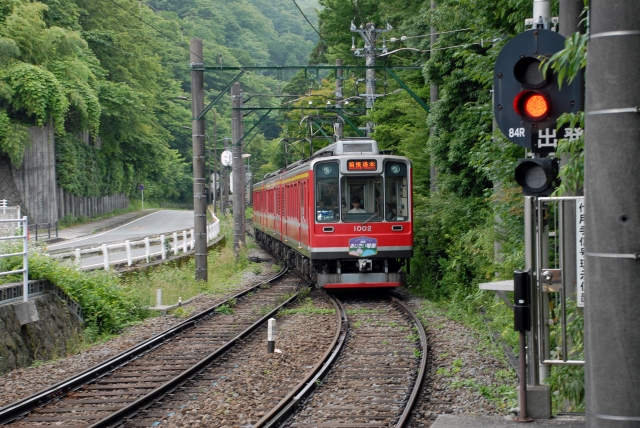
The Hakone Tozan Railway is one of the best ways to move around the Hakone region. The electric tram is the oldest mountain railway in Japan and has a lower part running between the small villages of Odawara and Hakone-Yumoto and an upper part running from Hakone-Yumoto to Gora. The scenic upper part moves up and down the mountains and ends at the Hakone Ropeway to Lake Ashi.
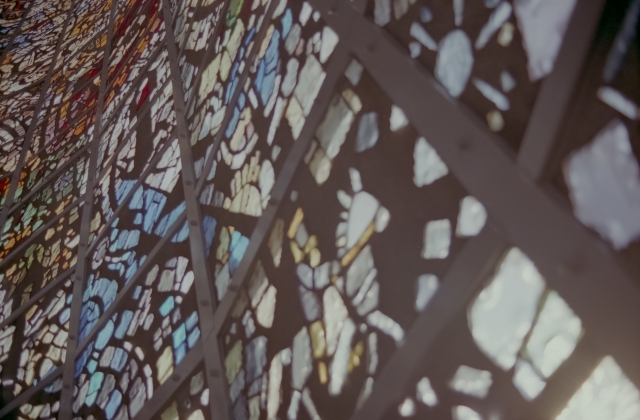
Art aficionado’s will enjoy visiting Hakone as there is a myriad of museums to choose from. Japan’s first open-air museum was built in Hakone with over a thousand sculptures and other works of art. The impressive Hakone Open-Air Museum has an outdoor sculpture park with works of Rodin and Picasso among other are placed out in the open. Indoor there are temporary as well as permanent exhibits with the most popular work being a massive wall of stained glass.
https://www.instagram.com/p/BM8wOSnBaMg/?taken-by=polamuseumofart
The POLA Museum of Art was created with a large artwork donation of the founder of cosmetics company POLA. The private collection of over 9,000 mostly contemporary and modern European and Japanese works of art are now displayed at the museum which is built in the midst of a forest.
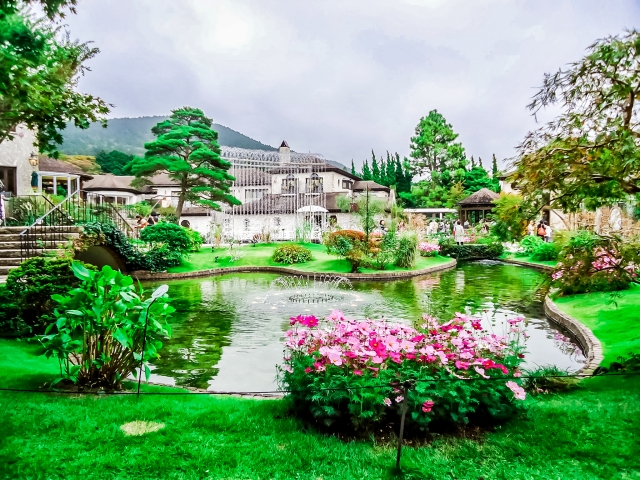
Other museums in the area are the Japanese paintings-focused Narukawa Art Museum, the Hakone Art Museum which is most famous for its moss garden, the Hakone Glass no Mori, a small theme park pictured above which focuses on Venetian glass, the East Asian art-dedicated Okada Museum of Art, and the Hakona Sekisho where a collection of weapons and armor is displayed.
General Information about Hakone Free Pass
Odakyu Hakone Free Pass transportation:
Round trip ticket on the Odakyu lines・from Shinjuku, Machida or Odawara
Use of Hakone’s 8 railways systems・Tozan Bus, Tozan Railway, Ropeway, Cablecar, Highway Bus, Sightseeing Cruise, Tokai Orange Shuttle Bus, Tozan Sightseeing Bus
Price Hakone Free Pass:
2-day per adult (12+)・¥5,140 ~ ¥4,000
2-day per child (6-11)・¥1,500 ~ ¥1,000
3-day per adult (12+)・¥5,640 ~ ¥4,500
3-day per child (6-11)・¥1,750 ~ ¥1,250
Hakone Free Pass Discount Service:
Many of the museums, onsen, gardens, restaurants, and shops in Hakone will give a discount upon viewing the Pass.
Travel Tips
How to get to Hakone
Option 1: Tokyo Station → Odawara Station → Hakone-Yumoto Station:
1. From Tokyo Station to Odawara Station (30 minutes):
Take the Tokaido Shinkansen from Tokyo Station to Odawara Station.
2. From Odawara Station to Hakone-Yumoto Station (15 minutes):
Transfer to the bus heading to Hakone or the Hakone railway and get off at the Hakone-Yumoto Station.
Option 2: Shinjuku Station → Hakone-Yumoto Station:
1. From Shinjuku Station to Hakone-Yumoto Station (1.5 hours):
Take the Odakyu Hakone Railway from Shinjuku directly to Hakone-Yumoto Station.
Recommended Reads









